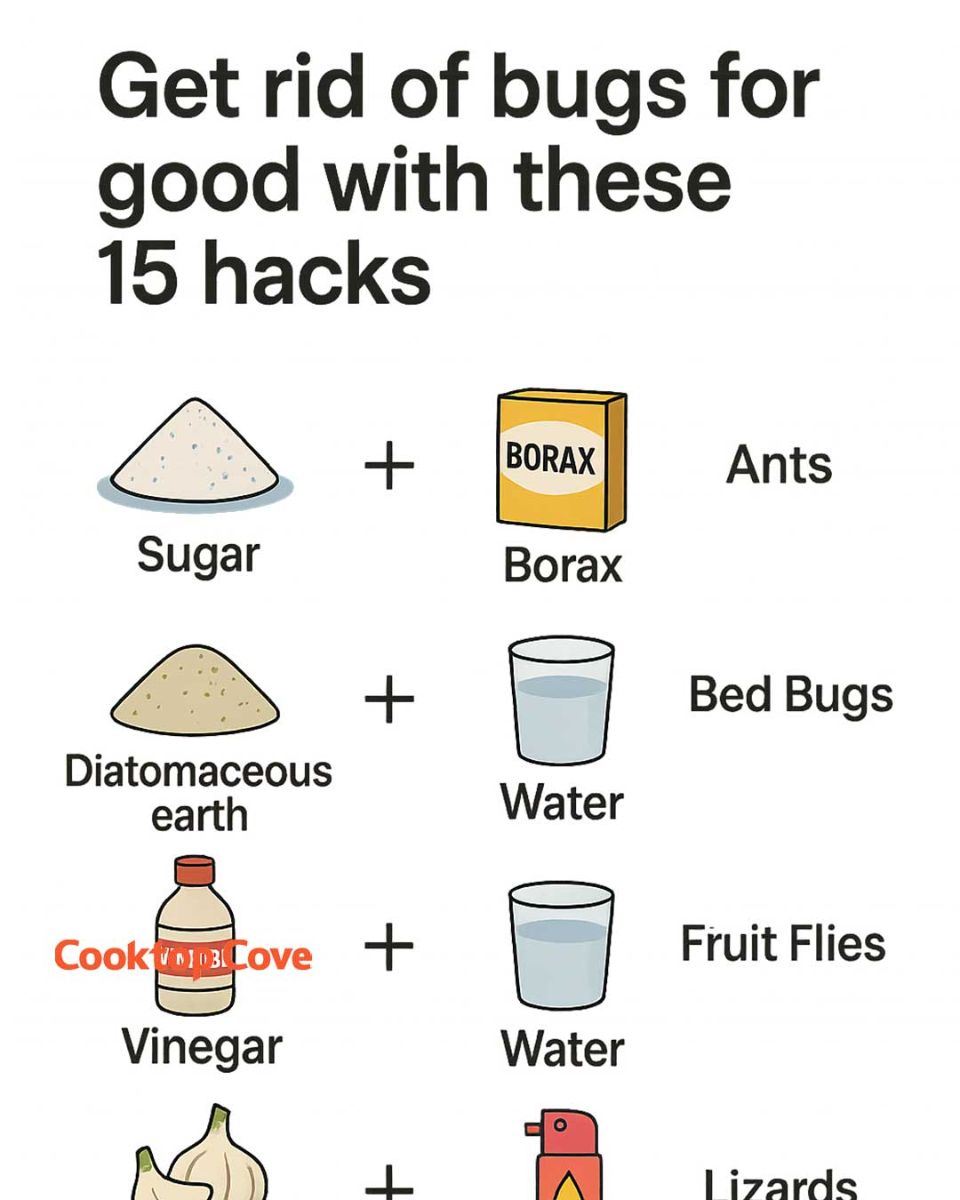Get rid of bugs for good with these 15 hacks
Morgan Reed
Contributing Writer
Print this recipe
Household bugs are a common nuisance that can disrupt the peace and comfort of our homes. From ants marching across the kitchen counter to mosquitoes buzzing around at night, these pests can be both irritating and potentially harmful. They can spread diseases, contaminate food, and cause allergic reactions. Traditional pest control methods often involve harsh chemicals that can be harmful to humans, pets, and the environment. Therefore, finding effective, natural solutions is crucial for maintaining a healthy living space.
Understanding the Importance of Natural and Effective Bug Solutions
Natural bug solutions offer a safer alternative to chemical pesticides. They help protect the environment by reducing the amount of toxic substances released into the ecosystem. Additionally, natural methods are often more sustainable and can be just as effective as their chemical counterparts when used correctly. By understanding the habits and weaknesses of various pests, we can employ targeted strategies to eliminate them without resorting to harmful chemicals.
Hack 1: Sugar and Borax Mixture for Ant Control
Ants are attracted to sugar, making it an effective bait when mixed with borax. Borax is a natural mineral that is toxic to ants but safe for humans in small amounts. To create this mixture, combine equal parts of sugar and borax, and add a little water to form a paste. Place the paste in areas where ants are commonly seen. The ants will carry the mixture back to their colony, effectively eliminating the entire nest.
Hack 2: Diatomaceous Earth and Water for Bed Bug Elimination
Diatomaceous earth is a natural powder made from fossilized remains of tiny aquatic organisms. It is abrasive and can dehydrate bed bugs upon contact. To use it, sprinkle a thin layer of diatomaceous earth around the bed frame, mattress seams, and other areas where bed bugs are suspected. Be sure to use food-grade diatomaceous earth and avoid inhaling the dust. For added effectiveness, lightly mist the area with water to help the powder adhere to surfaces.
Hack 3: Vinegar and Water Solution to Trap Fruit Flies
Fruit flies are attracted to the smell of vinegar. To trap them, mix equal parts of apple cider vinegar and water in a bowl, and add a few drops of dish soap. The soap reduces the surface tension, causing the flies to sink and drown. Cover the bowl with plastic wrap and poke small holes in it to allow the flies to enter. Place the trap near fruit or other areas where fruit flies are a problem.
Hack 4: Garlic Cloves and Pepper Spray to Repel Lizards
Lizards dislike the strong smell of garlic and pepper. To create a repellent spray, crush a few garlic cloves and mix them with water and a teaspoon of ground black pepper. Strain the mixture and pour it into a spray bottle. Spray the solution in areas where lizards are commonly seen, such as windowsills and doorways. The smell will deter them from entering your home.
Hack 5: Essential Oils as a Natural Mosquito Repellent
Essential oils like citronella, eucalyptus, and lavender are known for their mosquito-repelling properties. To make a natural repellent, mix a few drops of essential oil with a carrier oil, such as coconut or olive oil, and apply it to exposed skin. Alternatively, you can add the oils to a diffuser or spray bottle with water to create a room spray. This not only keeps mosquitoes at bay but also leaves a pleasant aroma in your home.
Hack 6: Baking Soda and Sugar for Cockroach Extermination
Cockroaches are attracted to sugar, making it an effective bait when combined with baking soda. Baking soda reacts with the acids in a cockroach’s stomach, causing it to die. Mix equal parts of sugar and baking soda, and sprinkle the mixture in areas where cockroaches are frequently seen, such as under sinks and behind appliances. This method is safe for homes with pets and children.
Hack 7: Lemon and Clove Deterrent for Spiders
Spiders are repelled by the scent of citrus and cloves. To create a deterrent, slice a lemon and insert whole cloves into the flesh. Place the lemon slices in areas where spiders are commonly found, such as corners and windowsills. The combination of citrus and clove will keep spiders away while adding a fresh scent to your home.
Hack 8: Eucalyptus Oil Spray for Dust Mite Reduction
Dust mites thrive in warm, humid environments and can cause allergic reactions. Eucalyptus oil is a natural mite repellent. To make a spray, mix a few drops of eucalyptus oil with water in a spray bottle. Lightly mist bedding, curtains, and carpets to reduce dust mite populations. Regular use can help alleviate allergy symptoms and improve indoor air quality.
Hack 9: Coffee Grounds to Deter Slugs and Snails
Coffee grounds are an effective deterrent for slugs and snails due to their caffeine content. Sprinkle used coffee grounds around the base of plants and garden beds to create a barrier that slugs and snails will avoid. This method not only protects your plants but also recycles coffee waste, making it an eco-friendly solution.
Hack 10: Neem Oil for Garden Pest Control
Neem oil is a natural pesticide that is effective against a wide range of garden pests, including aphids, whiteflies, and caterpillars. To use neem oil, mix it with water and a few drops of dish soap to help it adhere to plant surfaces. Spray the solution on affected plants, ensuring coverage on both sides of the leaves. Neem oil disrupts the life cycle of pests, reducing their populations over time.
Hack 11: Cedar Chips to Repel Moths and Other Insects
